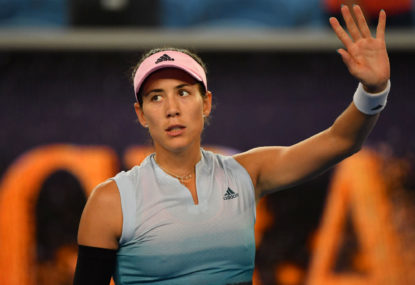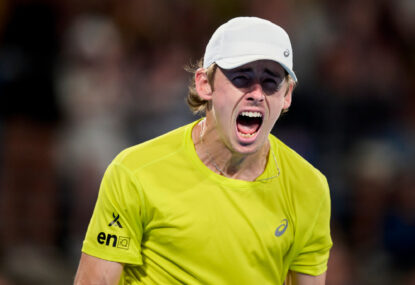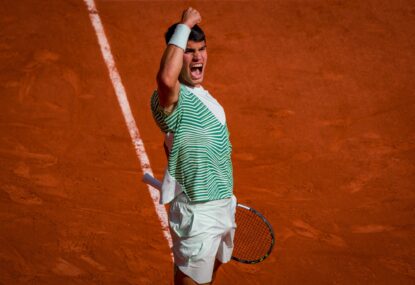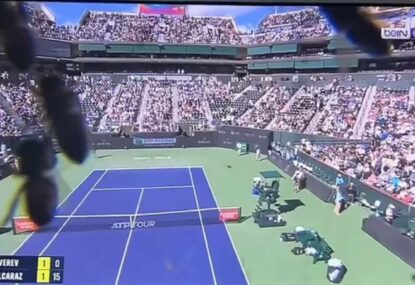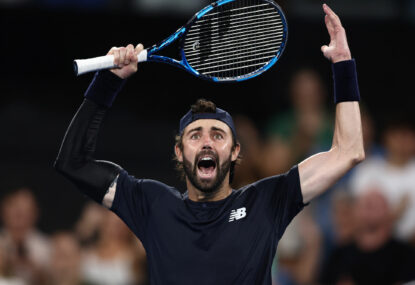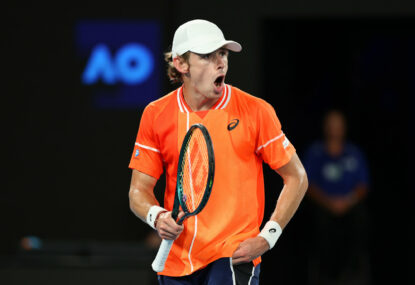The long-running debate as to who is men’s tennis’ GOAT has taken a new turn, after Rafael Nadal claimed a record-breaking 21st major men’s singles title in one of the most dramatic and extraordinary grand slam finals you will ever see.
Going into Sunday night’s men’s championship match against Daniil Medvedev, all the anticipation centred around whether the legendary Spaniard could break a tie he held with Roger Federer and Novak Djokovic for the most major men’s singles titles (20 each).
Neither Federer or Djokovic were able to participate at the Australian Open due to injuries and visa issues respectively, leaving the King of Clay as one of the favourites to lift the Norman Brookes Challenge Cup for the first time since 2009.
However, standing in his way was Medvedev, who in his previous major appearance had managed to prevent Djokovic from claiming his 21st major title at the US Open last September, and was intent on doing the same against Nadal.
A double break in the opening set was enough for the Russian to claim the opening set 6-2 in what turned out to be the shortest set of the final, clocking in at 42 minutes.
The second set was a war of attrition, with Nadal appearing to gain an advantage when he broke early for a 3-1 lead. He would then reach set point at 5-3, however Medvedev would not give in, breaking back to force a tiebreak, which he would win by seven points to five.
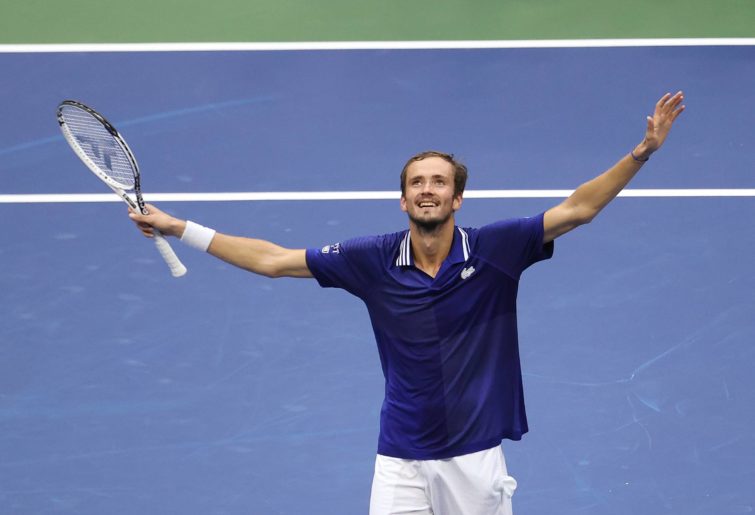
(Photo by Al Bello/Getty Images)
Half an hour separated the time between Nadal holding set point and Medvedev storming back to win it in a tiebreak to take what appeared to be an unassailable two-sets-to-love lead and leave the Spaniard on the ropes.
That set clocked in at an hour and 24 minutes, and anyone who wanted the King of Clay to make a comeback would have to be mentally prepared for the prospect of a post-midnight finish.
At this stage, the Spaniard appeared down for the count – if he was going to come back from here, he’d have to do what he had never previously done in a major final – not even at Roland Garros – and what had not been done in an Australian Open final since 1965.
That was to come from two sets to love down – something he hadn’t done at any slam since overhauling Mikhail Youzhny in the fourth round at Wimbledon in 2007 (where he’d later lose a five-set final against Roger Federer).
History was also against the 35-year-old, who had never won a major final outside of his Paris kingdom after dropping the first set, let alone the first two; conversely, Medvedev was 18-0 when he wins the first set in an Australian Open match.
With games on serve in the third set, Medvedev raised three break points on Nadal’s serve in the sixth game – however the King of Clay would wipe them out, then hold his serve and then break en route to taking the third set 6-4.
This is regarded as the major turning point in the match, because had Medvedev converted any of those three break points, chances are he could’ve wrapped it up in straight sets before 11pm.
Similarly, had Danielle Collins served out the second set at 5-1 and 5-3 in the women’s final on Saturday night, chances are there could have been a totally different outcome, though Barty’s experience in three-set finals would’ve proven a telling factor.
A break early in the fourth set was enough for the 35-year-old to take it by the same scoreline right on the stroke of midnight, which meant that, for the first time since the memorable 2012 Australian Open final, a major final would be decided in the early hours of morning.
This also meant that Nadal has now taken part in the only three major finals to ever finish after midnight, the other being his five-set victory over Federer in the 2009 Australian Open final.
Medvedev faced a break point in the opening game of the final set, but held serve before the Spaniard broke in the fifth game for a 3-2 lead.
He had been in this position before in five-set finals against Djokovic and Federer in 2012 and 2017 respectively, only to then drop his serve on each occasion and henceforth lose the match.
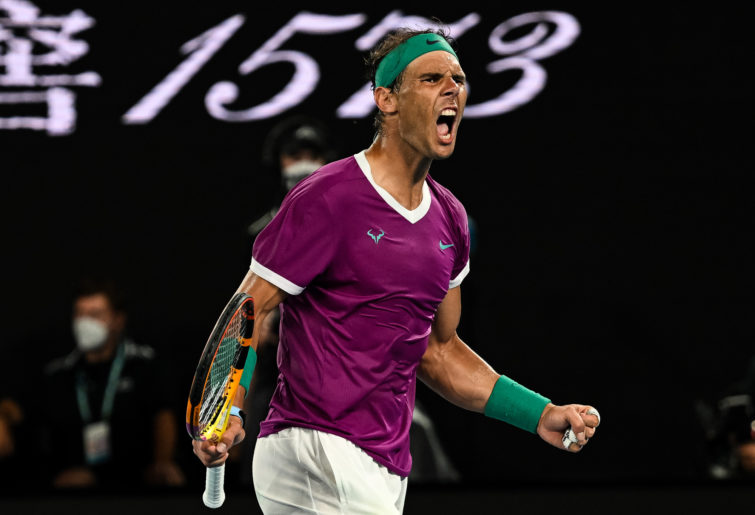
(Photo by TPN/Getty Images)
Then, while serving for it at 5-4, he led *30-0 before Medvedev won four points in a row to break back and extend the match; by this point, over five hours of match time had elapsed.
Facing yet another heartbreaking Australian Open final defeat, Nadal broke again in the 11th game for a *6-5 lead, and then raised three championship points, finally winning it on the first off a backhand volley forcing an error from Medvedev at 1:11am.
This was roughly or close to the same time in which he completed his epic five-set victory over Fernando Verdasco in the 2009 semi-final.
With the total match time clocking in at five hours and 24 minutes, it was half an hour shorter than what it took Djokovic to defeat Nadal in the 2012 Australian Open final, which didn’t end until after 1:30am in the morning.
A major drought had also finally ended, 13 years having passed since the Spaniard first raised the Norman Brookes Challenge Cup when he, as mentioned above, defeated Federer in a five-set classic that didn’t end past midnight.
His relief at finally ending his Australian Open curse was clear to see as he celebrated on court before embracing his team, lifting the trophy and then being so exhausted to the point where he could not conduct his post-match interview with Channel Nine.
In the intervention, the King of Clay had suffered his fair share of bad luck at Melbourne Park; those two gut-wrenching defeats in 2012 and 2017 aside, he was twice forced to retire mid-match due to injuries in 2010 and 2018, and missed the tournament due to a stomach bug in 2013.
His bid for the Rafa Slam was ended by compatriot David Ferrer in the quarter-finals in 2011, while he was also underdone by injury in the 2014 final against Stan Wawrinka, lost to Verdasco in a first-round five-set epic in 2016 and was run down from two sets up in the quarter-finals against Stefanos Tsitsipas last year.
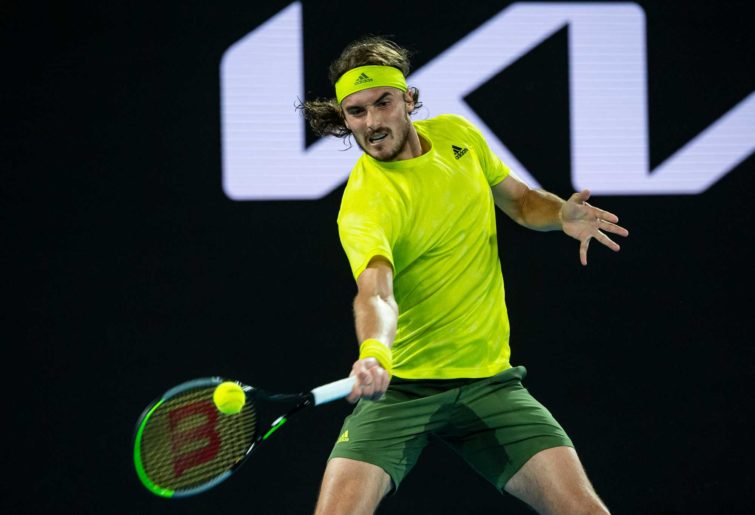
(Photo by TPN/Getty Images)
Even his participation at this year’s Open was in jeopardy after he underwent foot surgery towards the end of last year, and also tested positive to COVID-19 shortly before Christmas.
But his win over Medvedev, which marked the first time Nadal had ever won a major final from two sets to love down – something Djokovic was able to do in the French Open final against Tsitsipas last year – has all but buried these demons once and for all.
He also joins the Djoker, Roy Emerson and Rod Laver as the only men to ever win each of the four grand slams twice.
Winning his 21st major men’s singles title also means he stands alone on tennis’ Mount Everest, and one would think that he would start as a hot favourite to extend his haul of major titles to 22 at Roland Garros later this year.
Of all active players, male or female, only Serena Williams (23) has won more major singles titles, however her haul has remained stalled since she won the 2017 Australian Open while, unknowingly at the time, eight weeks pregnant with her first daughter.
As for Medvedev, it was his second five-set loss to the Spaniard in a major final, having also suffered similar heartbreak at the 2019 US Open, but while he was painted as a tournament villain he lost no friends in defeat.
If he had won, he would’ve become the first man outside of tennis’ ‘Big Four’ (namely Federer, Nadal, Djokovic and Andy Murray) to hold the world No.1 ranking since Andy Roddick in 2004 on February 21.
But having already won the US Open last year, there is no doubt there will be more major titles on his way, so long as he and others can raise his game to the same level as their more experienced counterparts.
For now, he takes a back seat as Nadal confirms himself as the greatest men’s tennis player mankind has witnessed this century.
Men’s championship result: [6] Rafael Nadal (ESP) defeated [2] Daniil Medvedev (RUS) 2-6, 6-7 (5-7), 6-4, 6-4, 7-5.
To finish off, congratulations to Rafael Nadal who stands alone at the summit of men’s tennis with a 21st major men’s singles title, and his second Australian Open title to go with the one he won in 2009, burying 13 years of hard luck at Melbourne Park in the process.
Commiserations to Daniil Medvedev, who has come up short in the final here for the second consecutive year; here’s hoping that next year will be third time lucky for the Russian, as it was for Marat Safin in 2005 after he had fallen short in 2002 and 2004.
That brings to an end what was a memorable 2022 Australian Open tournament, which has produced two well-worthy winners in Rafael Nadal and Ashleigh Barty, who buried 44 years of local disappointment with her victory in the women’s singles.
For Australian fans desperate for their immediate quick sporting fix, we are currently partway through the AFL Women’s and A-League men’s and women’s seasons, while it is over a month before the AFL and NRL seasons commence.
The Winter Olympics, to be held in Beijing 14 years after the city hosted the Summer Games, officially begin this Friday, though competition commences on Wednesday.
As for the tennis, it’s off to Roland Garros on May 22, then Wimbledon on June 27 and the US Open on August 29 before we do it all again here at Melbourne Park on Monday, January 16, 2023 – and what an opening day it could promise to be as Ashleigh Barty begins her title defence on Rod Laver Arena.
































































































